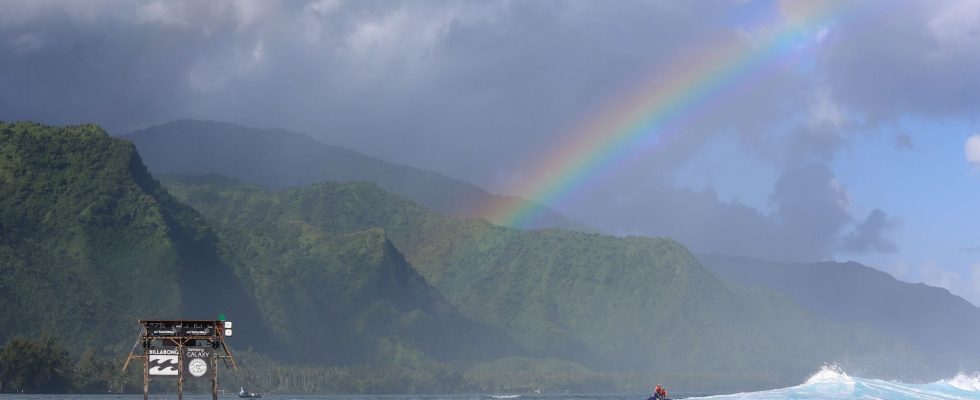The State persists on the choice of the surfing site for the Paris 2024 Olympic Games. Friday November 10, on the sidelines of the unveiling of the Paralympic flame route in Saint-Denis, the Minister of Sports Amélie Oudéa-Castéra assured: the Teahupo’o site, in Polynesia, remains the “central option” for the surfing events at the 2024 Olympics.
However, tensions are high between Papeete and Paris, while new discussions are planned “this weekend” between the minister and the president of this autonomous French archipelago. Because nine months before the competition, the population and the local government strongly criticize the project to install a new infrastructure in the middle of the lagoon of this natural site.
Criticisms focused on a new aluminum tower
A site chosen initially for good reasons. In her last statement, Amélie Oudéa-Castéra recalled the quality of this “extraordinary site of Teahupo’o, where there is this incredible wave, absolutely unique in the world”. However, the organizing committee of the Olympic Games plans to install, for the judges, a new aluminum tower 14 meters high, in the middle of the lagoon. The cost of this infrastructure, already built, is estimated at more than 4 million euros. It would thus replace the current wooden tower, usually used for international competitions but which no longer meets standards.
However, this installation project has been strongly criticized for several weeks by local residents, surfers and environmental activists. It would be necessary to replace the marine foundations of the old judges’ tower with new ones, which would, according to them, risk damaging the coral on the site.
A local tension that reaches the political sphere
A controversy has recently been superimposed on these latent tensions: that of the trip of the mayor of Paris, Anne Hidalgo, to the archipelago. After a trip at the end of October to New Caledonia and then to French Polynesia, the right-wing opposition in the municipal council denounced a few days later the use of public funds and the ecological cost of this “mop at the expense of Parisians”. An official visit, however, validated this Saturday, November 11 by the ethics commission of the city of Paris, and which aimed in particular to discuss the surfing event on the Tahitian site.
However, the town hall’s response to this controversy underlined the delicacy of the subject between the metropolis and the archipelago: Anne Hidalgo admitted not having gone to the surfing site in person, leaving the place to her deputy for Sports, Pierre Rabadan. A choice made “at the request of Polynesian President” Moetai Brotherson, due to “local tensions”.
If the president of French Polynesia initially tried to reassure opponents of the project, the pro-independence politician finally joined their demand to change the surfing site. On Wednesday November 8, he told AFP that he did not see “where we could get the barge [de la foreuse] […] without exploding coral.
Alternatives still uncertain
This recent turnaround does not help the Olympic Organizing Committee, Cojo, which has been negotiating for several weeks with the autonomous Polynesian government to find an alternative. President Moetai Brotherson is now considering moving the event to another spot: Taharuu, less renowned but easier to access than Teahupo’o, on the west coast of Tahiti. According to him, the site would be “equipped with all the infrastructures on land”, which would avoid building a judges’ tower offshore. An option that was ruled out during the organization of the surfing events, but “which we can revise”, says Moetai Brotherson.
Other solutions have nevertheless been put forward to maintain the tests at Teahupo’o. If it is too late to build a new wooden tower similar to the one planned in aluminum, another option considered would be to install the metal tower already built on the wooden foundations of the old tower, according to a source close to the matter to the AFP. But the possibility is “technically” uncertain, according to this same source.
However, time is running out: the proximity of this debate to the start of the 2024 Olympics in nine months makes the hypothesis of a move unlikely. The French state could therefore impose its choice against the advice of the local government, at the risk of giving fodder to the independence movement in power. Since 2013, French Polynesia has been considered by the UN as a non-autonomous territory to be decolonized.
